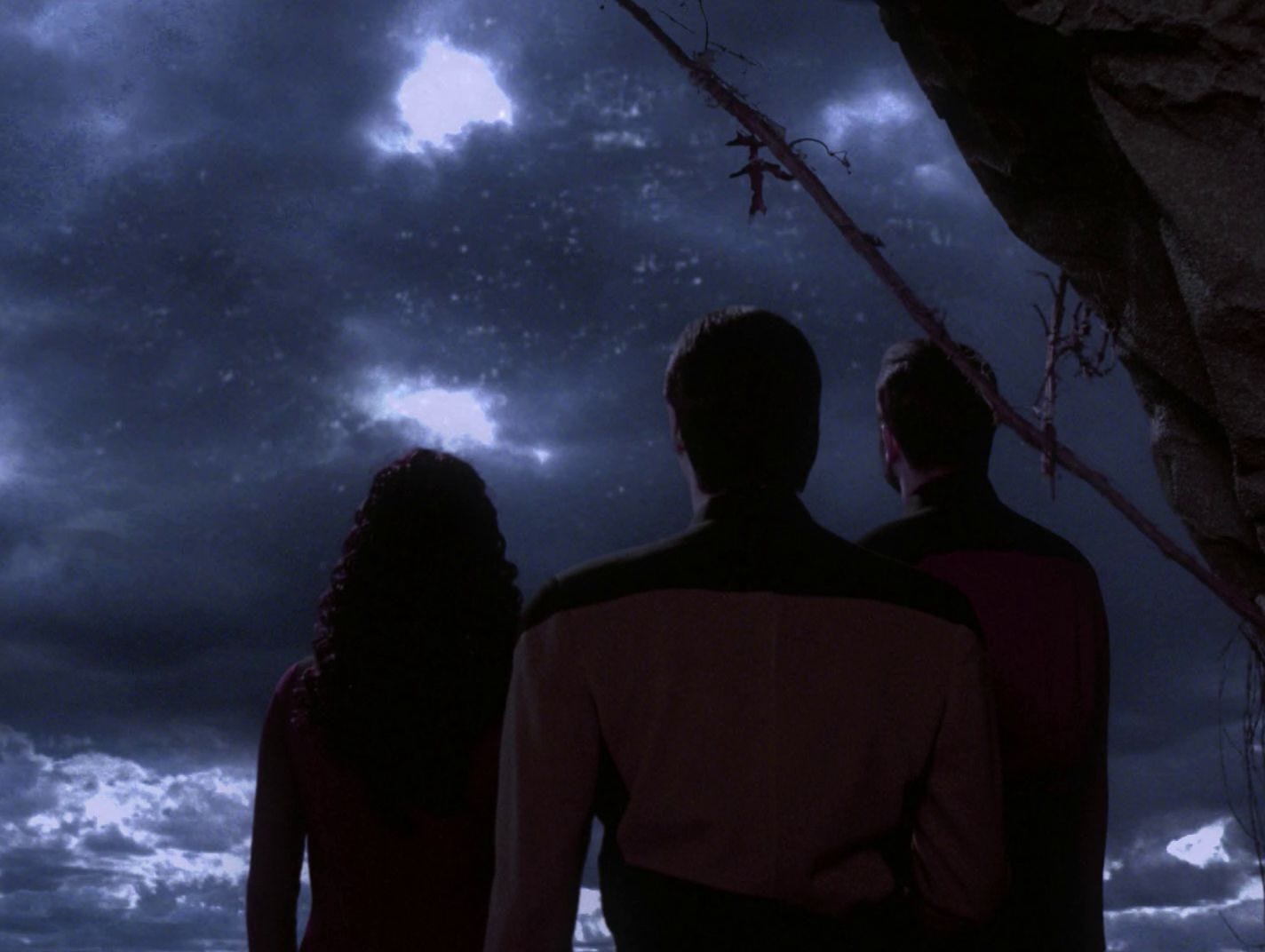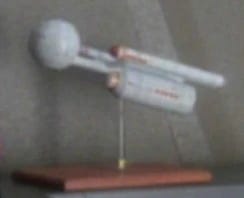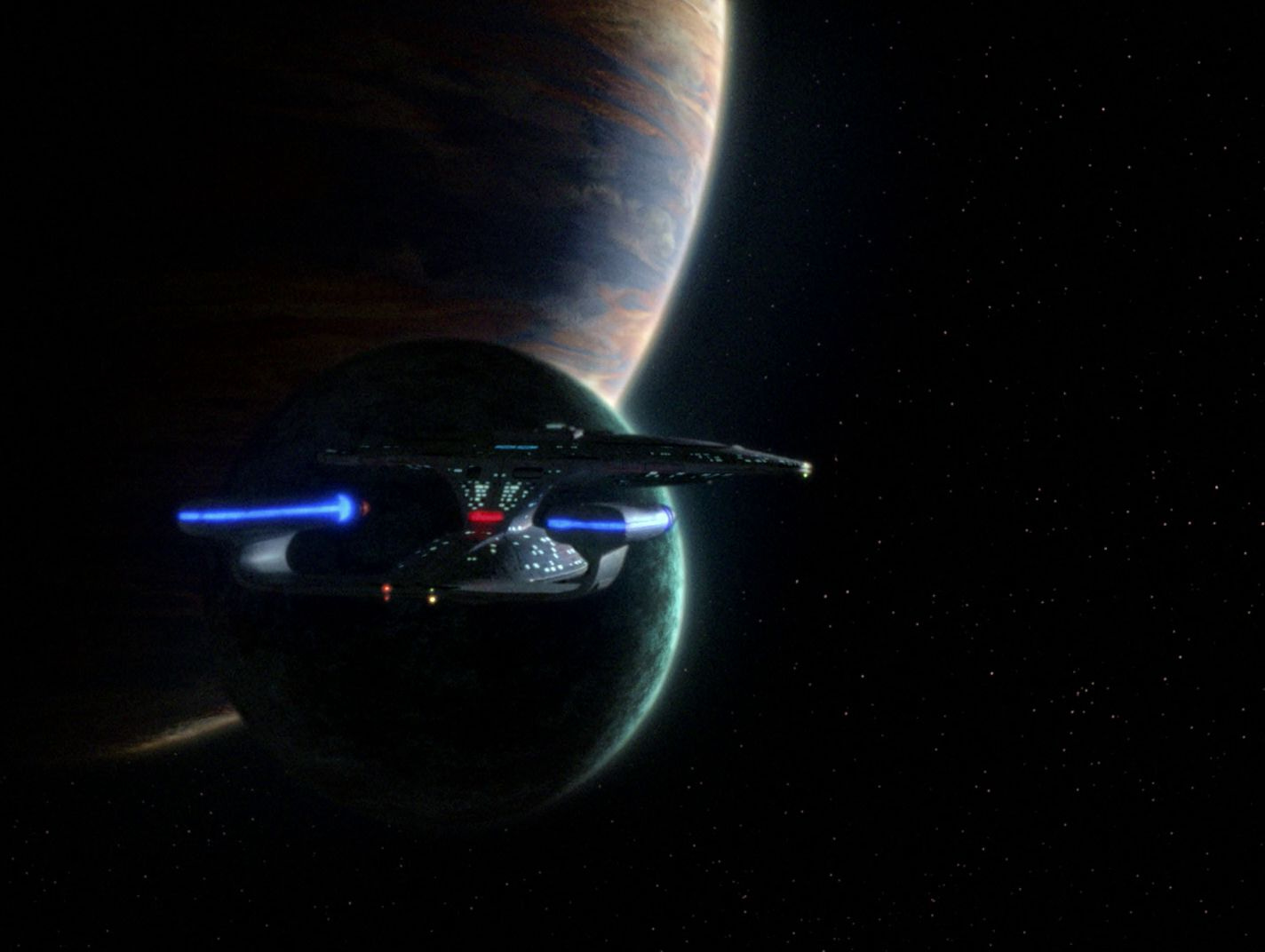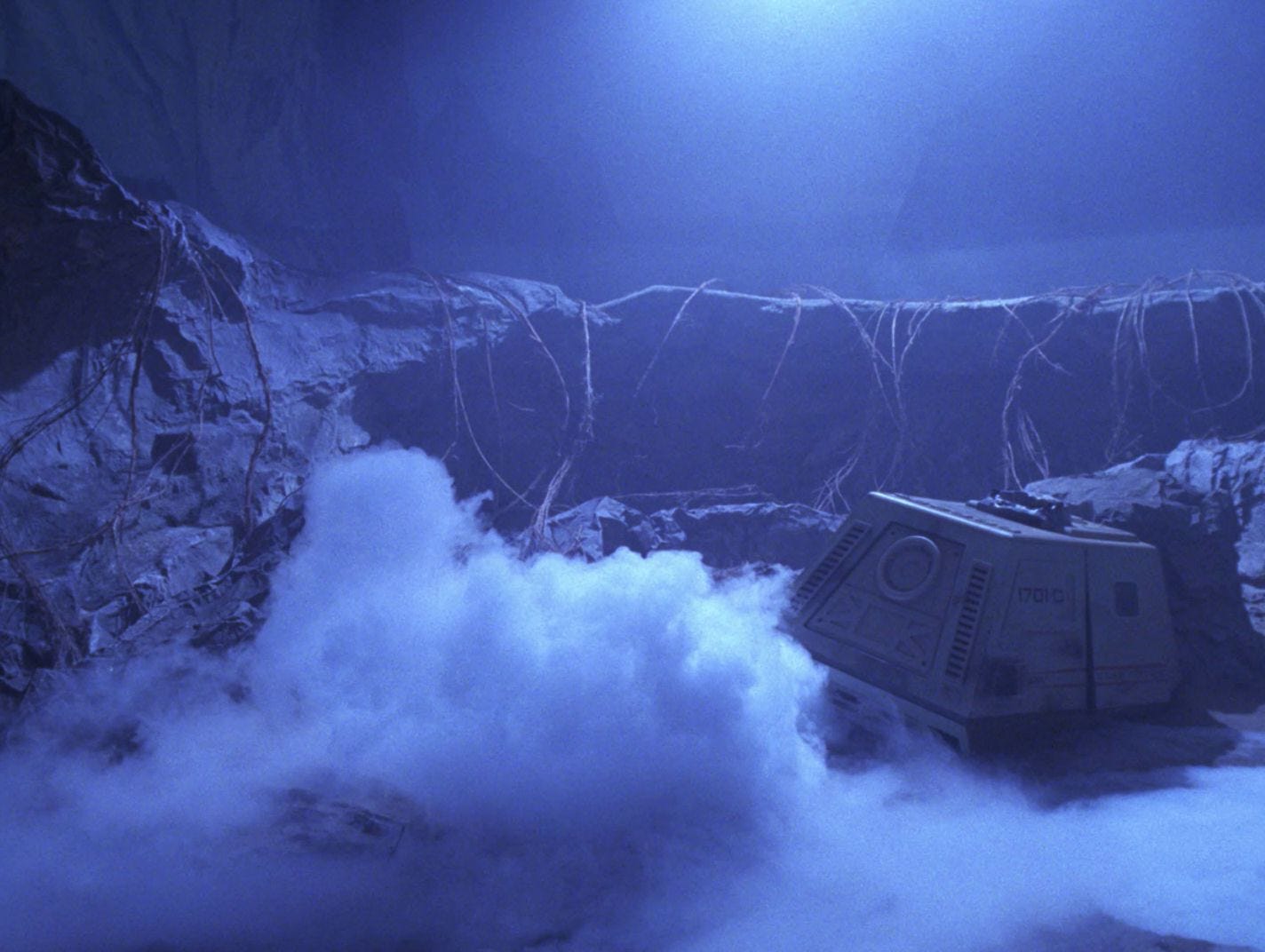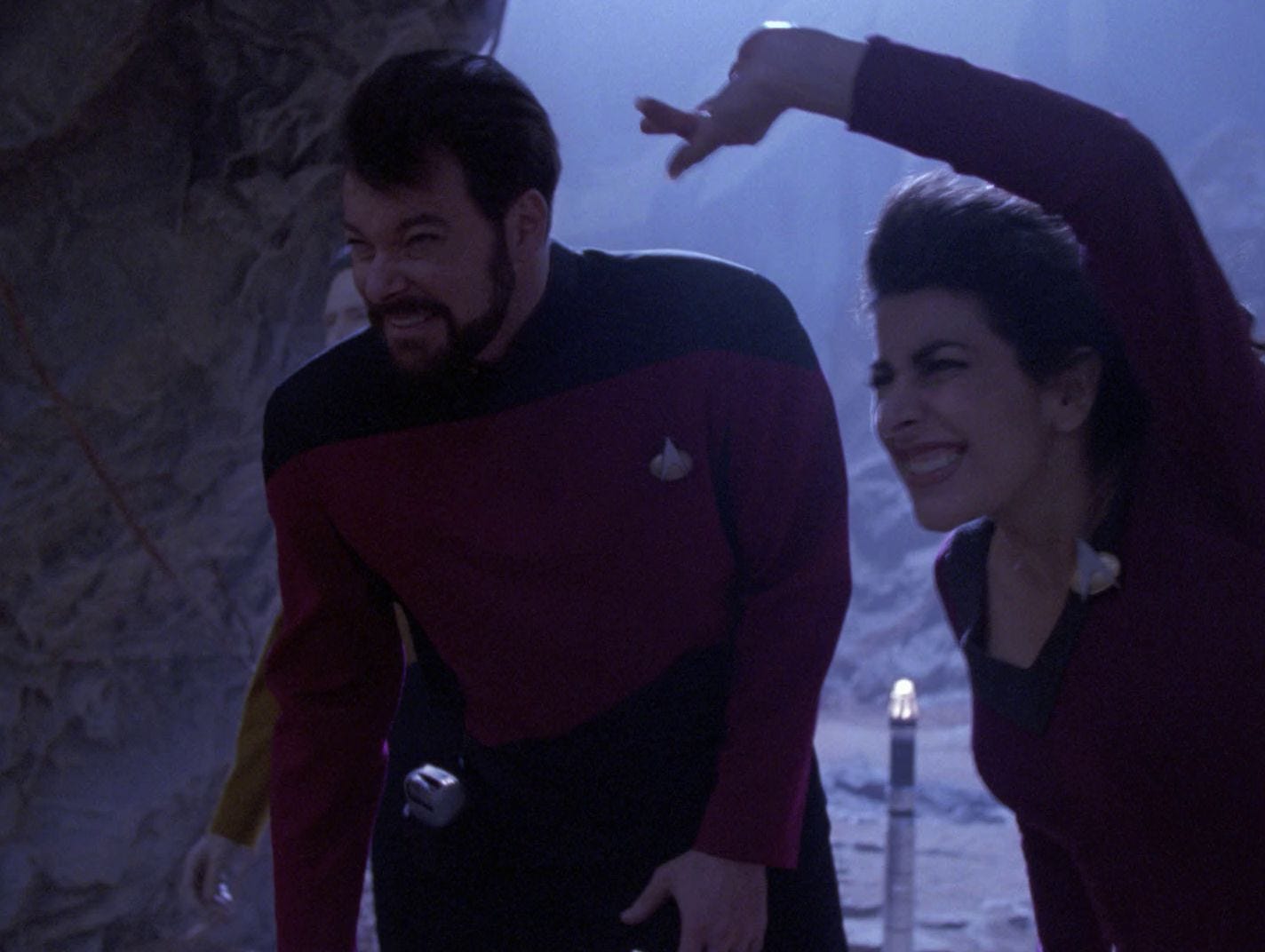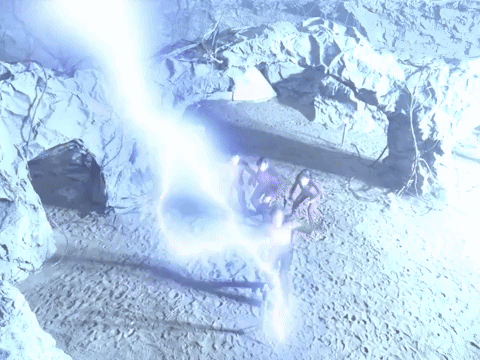Power Play
Miles O'Brien teams up with Troi and Data to take over the Enterprise-D - we're all rooting for you, Chief!
Riker leads an away team with Troi and Data via a bumpy shuttle ride to crash on a planet that we’ve stumbled across this week. Miles O’Brien to the rescue! He does some magic with pattern enhancers and beams down to rescue them - but a lightning strike knocks them all out. Glowy lights descend on everyone, except they reject Riker because he’s not cool enough. The newly possessed crew try subterfuge to get what they want but end up just kicking ass - O’Brien beats up Worf on the bridge (Worf 16, Aliens 17) and then, in case that wasn't embarrassing enough for our heroic Klingon, Troi blasts him with a phaser in Ten Forward (Worf 16, Aliens 18). Suddenly, we’re in a hostage situation in Ten Forward as our mysterious intruders try to strongarm the Captain into meeting their demands. Can the crew overcome these body snatching terrorists without harming their possessed crew mates...? Well, of course they can, but it’s fun to watch all the same.
Words
This one began as a pitch by Paul Ruben - his only writing credit on anything that I can find - but nobody seems to know why Maurice Hurley shares the ‘Story by’ credit. Either that pitch came back in season two, when Hurley was the lead writer (which I doubt) or else Hurley worked on the treatment as a freelancer after leaving the show (which weird as that would be is by far the most likely explanation). Still, it’s a mystery and nobody seems to have any clues to help solve it. Whatever the story-behind-the-story, the final screenplay mentions that this episode was formerly known as “The Invaders”, “Terror in Ten-Forward” and (hilariously) “Feeling Poorly”. I suspect that last title was just an in-joke, but it made me chuckle!
Less mysterious is the credit for the teleplay. Rene Balcer (executive producer and frequent writer for various Law and Order shows) wrote the initial draft, and it eventually was assigned to Brannon Braga to deliver, who had a tough time of it:
The first time I wrote it, I thought, bottle show: Ten-Forward, Picard and Troi talk. Mike Piller said don’t be afraid to write seven or eight page scenes with Picard and Troi. I said, “Okay, Mike, I won’t.” Jesus! Seven or eight pages? I had a tough time writing that and when I turned it in, Piller said he felt that we’d taken it as far as it could go and we shouldn’t produce it. If it had been produced as I had written it, the episode would have been a little too familiar as a hostage show. So what happened was Herb Wright had just come in and Mike said we need some new blood, and gave it to Herb. Together we came up with the twist of them claiming to be the ghosts and that’s what I think brought the show level up and gave it a dimension of mystery and twists that it really needed.
Braga was a fan of the final episode:
In the end it turned into a really great action show. To me, it was a breath of fresh air. It had no pretensions. Instead of exploring some theme or idea, it was just action and phaser blasts. What are you going to do, deny that and say it’s not fun?
That is, ironically, what Michael Piller did say about the episode. He was pleased with the direction of the final show, but not the screenplay. He wanted it to feel like Key Largo or The Petrified Forest - dark and brooding. However, I suspect the real reason he was unhappy is that this was supposed to be a cost-saving bottle show and it ended up becoming quite expensive.
This is the first mention of the ‘Daedalus class’ starship, the design of which was circulated behind the scenes for quite a long time, although it never appears on screen during the main production history of Trek unless you count the model in Sisko's ready room in DS9 (which is never named on screen as such).
The U.S.S. Essex is a name that amuses me, since Essex is a county east of London that has some rather negative stereotypical associations in the British mind. However, it’s actually named after the World War II aircraft carrier, the USS Essex, which classic Trek producers D.C. Fontana and Robert H. Justman had picked as a ship name way back in 1967. This ship was named after Essex county in New Jersey, which of course was named after the ‘real’ Essex back in jolly old England.
In more naming fun this episode, the shuttlecraft is named the Campbell, which was after John W. Campbell, the editor of Astounding Science Fiction (later retitled Analog). I think this is the first time that a shuttle was named after a science fiction writer rather than a scientist, astronomer, natural philosopher or some such.
Acting Roles
The joy of this episode is that three of the regular cast get to play villains. As director David Livingston later remarked:
It was a chance to work with them and create totally new characters, and that was a lot of fun. We came up with names for them on the set. Marina was ‘Slash’, Data was ‘Buzz’, and Colm was ‘Slugger’.
Love it!
I really enjoy Marina Sirtis’ Slash - that steely edge to her voice is marvellous! Brent Spiner’s Buzz is a bit blunt, but Spiner gives an excellent sneer. He had the problem of trying to avoid acting or sounding like Lore, since the show had already given him an evil twin to play, but he still had good fun with this, as he always seems to when being asked to play a different role. Finally, Colm Meaney’s Slugger is a delight... having him conflicted over his host body’s recollections of the relationship with Rosalind Chao’s Keiko O'Brien is brilliant television. I guess this also means that Meaney had finished shooting The Commitments at this point.
Michelle Forbes’ Ro Laren is mostly wasted here. She’s really seems to in the episode solely so that she can take up the Tactical Station while Worf is being held hostage, although she does get to fire a phaser during the initial assault too. If some no-name crew member had done that, you know they’d have ended up dead!
And below decks we have a spare transporter operator in the shape of Ryan Reid, since our regular Transporter Chief is busy being possessed.
Reid only had four acting roles, including a guest appearance on Quantum Leap before this, following on from ten appearances as Jeff Dolan on US daytime soap As the World Turns. No idea why he gave up acting, but on the basis of his unmemorable appearance here I’m guessing he decided to cut his losses.
Models, Make-up, and Mattes
I do love the planetary matte shot that opens the episode!
It’s far better than the shuttlecraft flight, which is hilariously ropey. Not from the outside, that looks great (also: expensive!)…
It’s inside the shuttlecraft that has the problem:
What you’re seeing here is someone physically shake the camera, while the cast members rock about randomly and someone blows dry ice at the windows along with a strobe effect. Actually, the more I watch it, the more I love this sequence, which brings to mind all the times the classic Trek Enterprise bridge crew threw themselves wildly from side to side!
The big set piece, though, is the return of ‘Planet Hell’ on Sound Stage 16,
It was an absolute pain to shoot, as the director recalled:
It was tough because we had atmosphere and wind and lightning. One of those elements is hard enough. Just being on Stage 16 is enough. But we had all of those elements, and eventually all the actors had to lie down in them. The stage floor had a sandy surface, so when you have the wind blowing, the sand starts blowing around and I was real concerned about it getting into people’s eyes.
Indeed, that’s exactly what happened. Marina Sirtis’ make-up became so bedraggled that she had to be taken aside for an emergency makeover on Sound Stage 9, since as Livingstone put it “the sand had sandblasted her and she looked like a house after the guys come through with their hoses.
This was not the only indignity Sirtis suffered either. When the crew is thrown backwards by the buffeting winds of the storm, Sirtis did her own stunt and flung herself backwards - landing sharply on her coccyx and breaking it.
She was the only member of the cast to do the stunt herself - and tragically, in the final shot her face is so barely visible there was no real benefit from her having done the stunt! As she mournfully remarked in later years: “It could have been Worf in Troi’s costume and we wouldn’t have known the difference.”
On the upside, this episode picked up an Emmy nomination for Outstanding Individual Achievement in Sound Editing for a Series. It didn’t win, but it picked up five technical Emmy wins this season, the most from any season of TNG. Perhaps that was some comfort for poor Michael Piller, who had to lick his financial wounds from the serious overspend on this episode.



